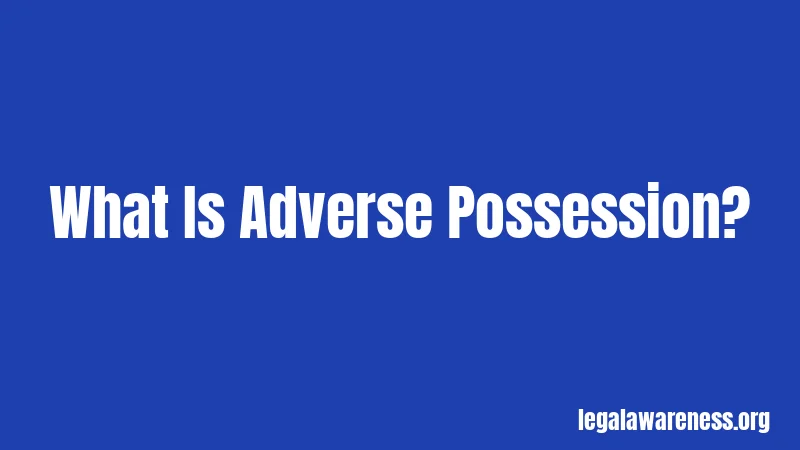Tennessee Squatter Laws in 2026: What Property Owners Must Know Right Now
Listen, if you own property in Tennessee, you need to understand squatter laws. Seriously. It’s not something most people think about until it’s too late. But here’s the thing: someone could potentially claim ownership of your land if you’re not careful. Tennessee has specific rules about this, and they can catch property owners off guard. Let’s break down exactly what you need to know to protect yourself.
Most people have no idea how serious these laws are. You could lose property worth thousands of dollars. Stay with me here. We’re going to cover everything from the basics to what you should do right now.
What Is Adverse Possession?

Okay, pause. This is important. “Squatting” and “adverse possession” aren’t exactly the same thing. Squatting means someone is living on your property without permission. Adverse possession is legal. It’s when someone gains rights to your land by occupying it for a certain period of time. Think of it like a legal way for someone to eventually claim your property.
Here’s where it gets interesting. In Tennessee, adverse possession is real. It’s on the books. And it happens more often than you’d think. Someone could literally take ownership of your land if they meet certain conditions. Pretty serious, right?
How Adverse Possession Works in Tennessee
Tennessee has clear rules about this. Someone occupies your property openly and without permission. They’ve been there continuously. They’ve paid property taxes on it. After a certain number of years, they can potentially claim ownership. Sound complicated? It’s actually pretty straightforward once you understand the requirements.
The process involves what lawyers call “elements.” Each one needs to be true for someone to claim the land. You’re not alone if you’re confused about these. Most property owners have no idea how specific the rules are.
The Seven-Year Rule in Tennessee

Here’s the main timeline everyone needs to know. In Tennessee, someone can claim adverse possession after seven years of continuous occupation. Seven years. That’s it. Not ten. Not twenty. Seven.
But wait, it gets more specific. The person must occupy the land. They must openly use it. They must do this without your permission. And here’s the big one: they must actually believe they have the right to be there. Honestly, this is the part most people miss.
Let me break down what “openly” means. The person can’t hide. They can’t sneak onto your land at night. They need to act like they own the place. They might build something on it. They might farm it. They might fix it up. A neighbor or random person would see them there regularly.
Key Elements of Adverse Possession
So what exactly needs to happen for someone to claim your land? Here are the requirements. Don’t worry, we’ll make this simple.
Open and Notorious Occupation
The person using your property needs to do it openly. You should be able to see them there or find evidence they’ve been using it. It’s not secret. It’s not hidden. They’re basically living like they own the place. If you drove by or visited, you’d notice someone was using your property.
Continuous Use
The occupation needs to be continuous. This doesn’t mean every single day without a break. But it does mean they can’t abandon it for months. They can’t use it sporadically. They need to maintain a consistent presence. Think of it like someone regularly using and occupying the land, not just stopping by occasionally.
Without Permission
Here’s a big one. The person cannot have your permission. You cannot have given them consent to be there. This is crucial. If you gave someone permission, they’re a tenant or guest, not someone claiming adverse possession. This protection is actually pretty simple. Just don’t give permission in writing.
Belief They Have the Right
This element is interesting. Tennessee requires that the person believed they had the legal right to be there. They thought they owned it or had the right to occupy it. This is called occupying the land with “color of title” or good faith. Either way, they need to believe their occupation is rightful.
Recent Changes to Tennessee Law

Hold on, this part matters. Tennessee hasn’t drastically changed its adverse possession laws recently. But in 2023, there were discussions about property owner protections. Many states have been tightening these laws. Tennessee property owners should stay alert for potential updates.
What this means for you right now: understand current law. Check your property regularly. Keep records of who has access. Don’t ignore trespassers. Ignoring the problem doesn’t make it go away. It literally can cost you your property.
Penalties and Consequences
Okay, let’s talk about what happens if someone successfully claims adverse possession against you. You could lose your land. Seriously. You could lose ownership of property worth hundreds of thousands of dollars. This isn’t a fine you pay. This isn’t a ticket. This is losing real property.
Here’s how it works. The person files a claim with the court. They prove they meet all the adverse possession requirements. The judge grants them a new deed. Your ownership ends. The property now belongs to them. You have to leave.
This is more serious than you might think. It’s not like a small penalty. It’s a complete loss of property rights. The person becomes the legal owner. You have no more claim to the land.
How to Protect Your Property in Tennessee
Wondering how to stop this from happening to you? Good news. You have real options. Here’s what you need to do.
Visit Your Property Regularly
This is probably the simplest protection. Visit your property. Check on it. Make sure no one is occupying it. Document your visits. Take photos or videos. Note the date and time. If you go to court later, you’ll have proof you knew what was happening on your land.
Post “No Trespassing” Signs
Put up clear signs. Make it obvious that people aren’t allowed there. This gives you legal protection. It shows you’re aware of trespassing. It shows you don’t permit occupation. Use professional-looking signs. Make them visible from the road or main approach points.
Send Written Notice
If someone is on your property without permission, write them a letter. Tell them to leave. Make it official. Send it certified mail so you have proof they received it. Keep a copy. This breaks any claim that they had your permission or that you abandoned the property.
Know Your Boundaries
Seriously, know where your property lines actually are. Some disputes happen because owners don’t know their exact boundaries. Get a professional survey done. It costs money upfront. But it saves you thousands if a dispute happens. You’ll know exactly what’s yours.
Keep Documentation
Document everything. Keep records of when you visit. Keep copies of signs you posted. Keep certified letters you sent. Keep photos of the property. Keep tax records and mortgage documents. If someone claims adverse possession, you’ll need this proof.
Consider Property Management
If you can’t visit regularly, hire someone to manage it. Rent it to a tenant. Have a caretaker check on it. Pay someone to maintain it. An occupied property is much harder to claim through adverse possession.
What You Should Know About Trespassing
Not sure what counts as trespassing? Let me break it down. Someone enters your property without permission. That’s trespassing. They don’t need to live there. They don’t need to stay long. Just being there without your okay is illegal.
Tennessee has criminal trespassing laws. Someone who knowingly enters property without permission is breaking the law. They can be charged. They can face fines. They can face jail time. But here’s the thing: you usually have to report it for police to act.
This matters because trespassing and adverse possession are connected. If someone trespasses, and you don’t stop them, they might eventually claim adverse possession. Stopping it early prevents bigger problems later.
Frequently Asked Questions
Can someone claim my property if they’ve lived there less than seven years?
Not through adverse possession. They need the full seven years of continuous occupation. But they could still be trespassing, so report it to police if you catch them.
What if I didn’t know someone was on my property?
It doesn’t matter. Lack of knowledge on your part doesn’t stop the clock. This is why regular property visits are so important. Document them clearly.
Does paying property taxes help me keep my land?
Honestly, yes. If you pay taxes on it, it’s harder for someone to claim through adverse possession. It shows you’re actively maintaining ownership. Keep all tax records safe.
Can I stop an adverse possession claim after it’s filed?
Yes, but you’ll need to go to court. You’ll need to prove they didn’t meet all the requirements. This is expensive and stressful. Prevention is way easier than fighting it in court.
What if the person has a written agreement from me?
If you gave written permission, they’re not claiming adverse possession. They’re a tenant or guest. You can still evict them through legal channels, but the adverse possession claim won’t work.
Final Thoughts
Now you know the basics. Tennessee’s adverse possession laws are real. They protect people who occupy land long-term. But they also threaten property owners who aren’t careful. The good news? You can protect yourself. Visit your property. Post signs. Send written notice if needed. Keep records. Stay informed.
Don’t wait until someone claims your land to take action. Prevent the problem now. Check your property regularly. Know your boundaries. Understand the rules. When in doubt, talk to a real estate lawyer. It’s worth the cost to protect your property.
References
- Tennessee Code Annotated Title 28, Chapter 2 (Property Rights and Adverse Possession)
- Tennessee Secretary of State: Property Records Guide
- Tennessee Bar Association: Real Estate Law Resources
- Tennessee Courts: Information on Property Disputes and Adverse Possession Claims
- Tennessee Property Owners Association: Understanding Your Rights
